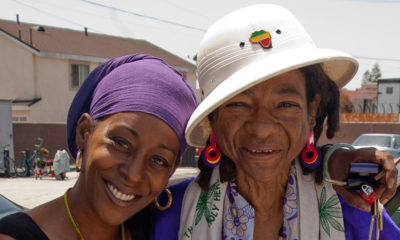
Q&A
Meet the Activists Leading the Charge for Cannabis Equity in New York
Advocates are already working hard to ensure New York’s soon-to-legal market and existing medical marijuana industry don’t squeeze out those disadvantaged during the prohibition era.
Cannabis has long illuminated a tale of two cities in New York. As a recent study from City Hall concluded, nearly 90 percent of marijuana arrests in New York City involved black and Hispanic individuals.
Furthermore, current law dictates that no one with a criminal record can work in the state’s medical marijuana industry, a move that disproportionately affects disenfranchised communities. Getting a license to own and operate a medical marijuana dispensary requires hundreds of thousands of dollars, which also tends to disadvantage minorities and women.
As an adult-use market becomes ever more likely in New York state, many residents are wary that the imminent legislation will offer limited benefits to disenfranchised communities. During his “State of the State” address earlier this week, however, Gov. Andrew Cuomo expressed his intentions to expunge cannabis from residents’ criminal records. “Let’s create an industry that empowers the poor communities that paid the price and not the rich corporations that come in to make a profit,” the governor stated during the speech. Yet skepticism still abounds.
Mary Pryor, co-founder of Cannaclusive, a firm that aims to amplify diversity in the cannabis industry through educational events and workshops, and Jacob Plowden, co-founder and deputy director of the nonprofit Cannabis Cultural Association, are among the activists leading the charge for equity in the state’s rapidly changing industry. I caught up with Pryor and Plowden following the governor’s address to learn more about their backgrounds in cannabis and how they enact constructive change in their communities.

Mary Pryor, co-founder of Cannaclusive. (Photo Courtesy Mary Pryor)
Both Pryor and Plowden will also be addressing questions about cannabis equity in New York state at a ticketed event on Wednesday, Jan. 16 at the Harlem Business Alliance.
Cannabis Now: I’d love to hear how you got involved in the cannabis industry.
Jacob Plowden: The Cannabis Cultural Association was formed in late 2015. We definitely saw the writing on the wall for legalization. I attended an abundance of events, from legalization to finance, and the constant trend I noticed was a severe lack of people of color. It made me wonder if my community had an idea about what was going on.
We had to look deep inside ourselves to realize this is something we have to stand up to. If we’re not ready to do so, we’re going to wait too long for a Superman to arrive. It’s about looking at equity, re-entry, expungement. Unless we’re in the room, no one’s going to speak up for us.

Jacob Plowden, co-founder and deputy director of the nonprofit Cannabis Cultural Association. (Photo Courtesy Jacob Plowden)
Mary Pryor: I really became more versed in cannabis when I got Crohn’s in 2013 — it rocked my whole health situation. I went from training for bodybuilding shows one day to landing in the hospital for two months, and almost dying. Almost two years into that diagnosis, I couldn’t work, I wasn’t happy, it was a myriad of struggles. I made as many different shifts as possible. I had friends sending me links and stories [about cannabis] and how it can treat Crohn’s. I learned which strains worked best. [I thought], “People need to know this is amazing!”
I was working in tech, digital marketing and Fortune 500 companies. I moved to LA, I wasn’t finding work. Being in tech and dealing with slight, cynical racism is like [the cannabis industry] but worse. I ended up making my own company with two other friends, and Cannaclusive was born in 2017.
What steps are you taking to address equity in the industry?
MP: I started Cannaclusive to address the lack of representation in cannabis. Now I’m involved in areas of deeper advocacy, making sure equity is in the front of conversation and not the back when it comes to what people of color can have access to; understanding what it means to have capital and having ownership of a business, versus just thinking about smoking weed all day.
JP: There needs to be a massive mobilization of community, industry and politics. We’ve learned that not one sector has all the answers. We’re trying to figure out a new strategy that allows people to converse with their local government, in terms of [issues like] zoning and license applications. When it comes to places like Harlem and the Bronx, it’s important to have that conversation now. You don’t want to have it when a dispensary opens on 125th Street [in Harlem] and people still can’t get involved in the industry.
MP: People need access to capital on Day One. On April 1, 2019, [when Gov. Cuomo has proposed that legal cannabis sales could begin], we should be right there with all the major corporations. Waiting for delays on that, a year or two years, is not acceptable anymore. We’re not in a position to expect that anymore, we don’t have to.
What did you take away from Cuomo’s address this week?
JP: We understand Cuomo’s strategy is based around empowering state revenue. Not to toot our own horns, but we saw it coming a mile away. It’s almost like a pot Paul Revere sounding cry for New York. It’s happening way faster than expected.
What advice do you have for folks who want to get involved?
MP: People have to consider the importance of equity in the space on a deeper level. We need to tell people what happens when you don’t take action. “Don’t” is an easier to thing to qualify than “do.” “Do” is variable. “Don’t” means here’s what you completely let go of. You need and deserve a place to play in the ownership game, whether that’s touching the plant or ancillary.
JP: I want people to understand — because it’s happening, and happening fast — don’t get swept up in loss or feeling left behind. Utilize what you have and apply it to your constituency, to teach someone how it can benefit their community and how it can empower entire generations of people.
TELL US, where do you see room for improvement when it comes to equity in cannabis?
























